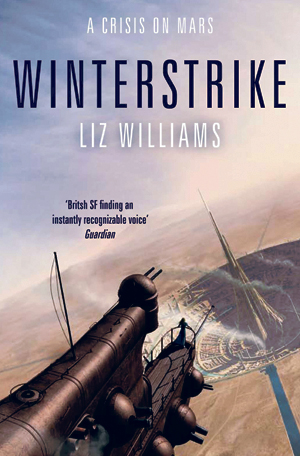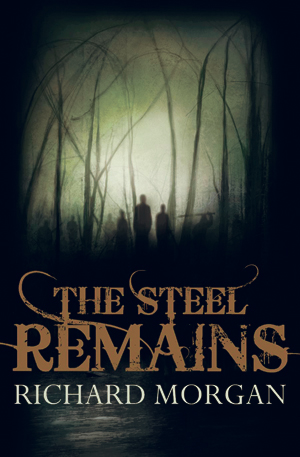The Last Watch by Sergei Lukyanenko (Heinemann)
Winterstrike by Liz Williams (Tor)
The Two Pearls of Wisdom by Alison Goodman (Bantam)
The Company by KJ Parker (Orbit)
Deep Water (Casting Trilogy Book 2) by Pamela Freeman (Orbit)
The Steel Remains by Richard Morgan (Gollancz)

In Sergei Lukyanenko’s three previous instalments of the Night Watch story, we learned the magical truth about the Molotov-Ribbentrop Pact — somebody got turned into an owl for that one — and that the whole trajectory of Soviet and post-Soviet history was a spin-off from a piece of wizardly manipulation gone wrong (or perhaps
right).
In Lukyanenko’s world of countervailing magical power the forces of darkness and light war for primacy. Increasingly, though, they find they must collaborate in the face of lawless (one might almost say terrorist) threats.
In this fourth book hero Anton is assigned to investigate an apparent vampire killing in Edinburgh, only to uncover a plot by an outlaw coven (the Last Watch) to assume power by seizing Merlin’s crown.
Despite how this sounds, Lukyanenko’s work fits neither with the clumsily written whimsy of Harry Potter (this book takes a sly sideswipe at pop-fantasy as the Watch members view a movie) nor the urban bodiceripping of Twilight and the Sookie Stackhouse genre.
It’s part political metaphor and — increasingly as the series develops — part psychological dissection of the impact of covert social engineering on all involved. There are reflections, in fact, on the ethics of limiting people’s freedom, even with honourable motives.
At the end Anton is compelled to revisit his own role in terminating a murderously criminal former friend. Along the way you’ll find wry humour, more of the hauntingly allusive lyrics of modern Russian pop music and a sensual evocation of the shabby exoticism of Uzbekistan.

The first fantasy explorer of those quirky, complex Eastern fringe states of the former Soviet Union was Liz Williams in Nine Layers of Sky. In her latest — her ninth — novel, Winterstrike, Williams returns to the Mars setting of Banner of Souls, where the scientific matriarchal elite who rule the cities of Winterstrike and Caud exist in implacable rivalry, haunted by the males they have excluded and driven back to the level of brutes.
The writer manages to raise disturbing questions about identity and responsibility in a context of thrillingly realised, often relentless, action: explosions, chases and fights. Williams is writing some of the most compelling science fiction action around at present, without sacrificing intellectual rigour.
Australian Alison Goodman made her name writing fiction for young adults and there are times when her adult debut, The Two Pearls of Wisdom, retains this slightly younger audience feel.
Set in an eclectic oriental world that draws from China, Japan and India, it employs the familiar trope of a girl masquerading as a boy, in this case to win fortune as the spiritual intermediary between dragon deities and a despotic court.
Despite the additional presence of a eunuch and a transgendered court lady among the good guys, it’s neither as deep nor as subversive about gender roles as it could be (for that, revisit Ursula le Guin), though the characters and world are appealingly realised.
Few writers have displayed the grotesque absurdities of war more ruthlessly than KJ Parker. In her first freestanding novel, The Company, she traps a band of veterans on an island where they hope to start a fresh, self-contained life based on farming with a bit of treasure-hunting on the side.
Then the scars and secrets of wartime start to spill open, sabotaging any possible adjustment to civilian life. Don’t expect happy endings. The secrets of war also shape Pamela Freeman’s Deep Water.
Unusually for the middle book of a trilogy, this volume has real substance, using a structure of timetravelling flashbacks to subvert the heroic mythology and racial stereotypes that motivated the characters we met in volume one.
Deep Water enriches both the world of the series and its characters and promises more of the unexpected in the concluding book.

Far more conventional in structure and action is Richard Morgan’s The Steel Remains. It’s a picaresque, Lock Stock and Two Smoking Barrels kind of a fantasy: a tale of swords and sorcery, full of spraying blood, necrotic undead and dark battlefields wit.
The plot plays a variation on the classic Thomas the Rhymer theme of a hero kidnapped by faerie folk and getting his brains fucked out at the enchanted court.
Morgan’s writing is as stylish and perceptive as ever and the book takes some wellmeaning cutlass slashes at homophobia — although Morgan has also constructed the gay protagonist with more than his fair share of stereotypes.